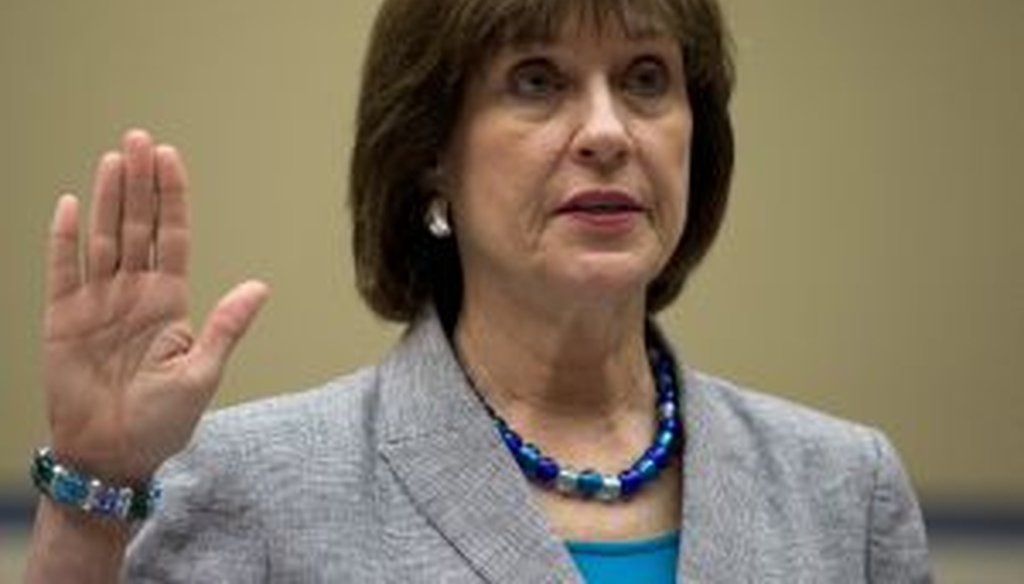Stand up for the facts!
Our only agenda is to publish the truth so you can be an informed participant in democracy.
We need your help.
I would like to contribute

IRS official Lois Lerner is sworn in on Capitol Hill in Washington, May 22, 2013, before the House Oversight Committee hearing to investigate the extra scrutiny IRS gave to tea party and other conservative groups applying for tax-exempt status. (AP)
The pundits on Fox News have made a point of arguing that the mainstream media has ignored congressional investigations into President Barack Obama’s IRS.
The next Watergate or Iran-Contra affair is right under the media’s disinterested nose, they say.
Fox News political commentator and syndicated columnist George Will has raised this point for almost a year and brought it up again on last week’s Fox News Sunday.
In case you’ve missed it, the controversy took off in the spring of 2013, when a Treasury Department inspector general found IRS employees inappropriately singled out applications for tax-exempt status from groups with the words "tea party," "Patriots" and "9/12" in their names.
On April 13, Will said the IRS fell victim to political influence akin to the Watergate scandal that cost Richard Nixon the presidency for his administration’s role in an attempted cover-up.
Sign up for PolitiFact texts
"It rises to that level because the Internal Revenue Service is the most intrusive and potentially the most punitive institution of the federal government and has been thoroughly politicized," he said.
He presented an array of examples, some dealing with Lois Lerner, the former IRS official who oversaw the tax-exempt organizations division before the controversy. He also cited IRS workers in other offices who openly campaigned for Obama using government resources, the leaking of a donor list of the National Organization for Marriage to a rival group, and external pressures on the IRS from Democratic senators.
"That's why this rises because as Bob Woodward remembers, the Watergate scandal was fundamentally, in the words of John Dean (Nixon’s counsel), using the machinery of the federal government to punish our enemies," Will concluded.
Here, we’re focusing on Will’s suggestion that the IRS scandal rises to the level of Watergate.
While we found Will's specific words too open to interpretation to fact-check, we think a primer on the situation will allow readers to draw their own conclusions.
Will did not respond for comment.
What’s up with that IRS scandal?
The IRS decides whether to approve groups for tax-free status. But rules about how much political activity is too much to keep a nonprofit label are not clear cut, which contributes to the agency's recent troubles.
The controversy touched off last year after the Treasury Inspector General for Tax Administration said IRS employees in the Ohio-based Determinations Unit used inappropriate criteria to screen groups seeking tax-exempt nonprofit status. The investigation was prompted by congressional Republicans concerned about conservative groups complaining of burdensome requests from the agency.
The scrutiny, which inordinately affected conservative groups, led to months-long delays in processing applications and unnecessary requests for additional information, such as donor lists and expenditures, the inspector general said. The report blamed ineffective management and poor guidance from higher-ups.
Most of the groups in the cases examined applied for 501(c)(4) status, which is a designation for social welfare groups. These groups are allowed to engage in limited political activity without disclosing their donors. Charities categorized as 501(c)(3) must follow clear standards and are not allowed to have political involvement.
Instead of focusing on groups’ planned activities, IRS employees erred in honing in on groups based on their name or focus, i.e. government debt and spending or criticizing how the country is being run, from early 2010 to early 2012. The audit found all cases with "tea party," "patriots" or "9/12" in their name were deemed potential political cases, though another 200 cases for groups without those qualifiers were also recommended for additional scrutiny.
The Treasury auditor agreed that a majority of the nearly 300 applications identified by IRS workers as potential political cases showed signs of significant political activity (i.e. the scrutiny ultimately was warranted). But 31 percent, including 17 tea party groups, did not.
Why would the IRS workers do this? Larry Noble, a counsel at the Campaign Legal Center who worked with Lerner when he was general counsel at the Federal Elections Commission, said the IRS was under enormous pressure from outside organizations and Democratic senators raising concerns about the rise of "dark money" groups after the Citizens United ruling. Of particular concern was Karl Rove’s Crossroads GPS, which spent millions in ads against Democratic candidates as a 501(c)(4) nonprofit.
While all sides have called the employees’ actions inappropriate (Obama used "boneheaded" in a February interview with Bill O’Reilly), they disagree on the motivation. Republicans say it’s evidence of politics seeping into a nonpartisan government agency to punish Obama critics. Democrats say the workers were just trying to find a way to capture obviously political-centric groups that did not have social welfare on their agenda.
State of the investigations
The IRS apologized for the inappropriate scrutiny, but it did not prevent several firings and a series of investigations launched by two House committees, the Senate Finance Committee, the Department of Justice and the FBI. The focus of the House committees has turned almost exclusively to the actions of Lerner.
Information released by House members on both sides of the aisle is usually slanted in their party’s favor. Rep. Elijah Cummings, D-Md., released documents that suggested the IRS also screened groups with key words such as "progressive’ and "occupy," and he accused the Treasury inspector general of conducting a narrow, conservative-centric review.
Democrats released an email last year from a top investigator in the inspector general’s office who said, after reviewing 5,500 IRS worker emails, he found no indication the scrutiny of tea party groups was motivated by political reasons, according to Bloomberg.
House Republicans, on the other hand, released evidence that an IRS office led by an Obama appointee was involved in wanting to know more about the targeting of tea party groups, though the documents did not prove the official knew about it.
Ahead of Tax Day 2014, the House Ways and Means Committee voted to refer its documents to the Department of Justice to pursue criminal charges against Lerner, and the House Government Oversight and Reform Committee voted to hold her in contempt because she did not answer questions. The committees say the IRS has stalled the release of more documents.
Absent her testimony, Republican committee members are poring over Lerner’s emails. She told colleagues in a 2011 email, "Tea party matter (is) very dangerous." She told Ohio workers to pass on potentially political cases to Washington, where they weren’t dealt with. Republicans also say Lerner was taking cues from Democracy 21, which had complained multiple times about Crossroads flaunting the tax code. She asked IRS officials before meeting with the group whether Crossroads had been audited, and when she found out the group had not, wrote, "You should know that we are working on a denial of the application, which may solve the problem because we probably will say it isn’t exempt."
Unnamed officials told the Wall Street Journal the FBI is not likely to pursue criminal charges having found no proof that the scrutiny was in an effort to hunt enemies.
As for the IRS, now led by Commissioner John Koskinen, it plans to release rules defining "candidate-related political activities" this fall that could cost groups tax-exempt status. The agency suspended its use of a "be on the lookout" list during the applications process.
For all the revelations, neither the inspector general’s report nor any of these ongoing investigations turned up evidence that the White House played a role in the targeting of tea party groups -- a key distinction some experts say nixes Will’s Watergate comparison.
All of the opinions
So was the scrutiny of tea party groups about punishing enemies of the White House a la Watergate?
Some experts sympathetic to Will’s point said his statement is a matter of opinion.
"I didn't see him saying that at all," said David Keating, president of the conservative-leaning Center for Competitive Politics. "All I got out of it was there is no investigation on this." (By that, he said he means no serious, visible effort to get to the bottom of things on the part of the administration.)
"It’s not really a fact to be judged true or false whether this is as big as Watergate or not," said Ilya Shapiro, Cato Institute senior fellow in constitutional studies.
The larger point is there remain many unanswered questions about the scandal, Shapiro said. Absent a direct order from the White House, Obama created a climate of "inflammatory rhetoric" in calling out tea party groups, shadow money organizations and super PACs during his campaign, which "sort of gives a wink and a nod to people who might be sympathetic to the president already, in terms of their personal politics, to do certain things," he said
But others find Will’s comparison overreaching based on what is known.
"It’s an embarrassingly inapt comparison," said Thomas Mann, senior fellow in governance studies at the Brookings Institution. "We have as of yet to discover whether there was a scandal in the IRS. We certainly have no evidence that anything was done for a political reason and certainly no evidence that there was any intervention on the side of the White House."
IRS staff must decide what constitutes "political intervention" and how much is too much, a tough call that allows for extreme discretion, said Gabe Rottman, ACLU legislative counsel. That IRS employees had the discretion to screen applications based on keywords that caught more conservative groups than liberal groups is a serious problem, Rottman said.
"I have seen no evidence that the targeting was politically motivated, which is what Mr. Will is suggesting, if I read his comments correctly," Rottman said by email. "But, practically, the targeting did disproportionately affect critics of the administration."
Lloyd Hitoshi Mayer, a Notre Dame Law School professor who studies nonprofit law, said the fact that Republican-led committees "are now focusing their accusations on a single, IRS career civil servant strongly suggests that they have failed to find any evidence to support accusing higher officials with wrongdoing despite investigating the exemption application mess for almost a full year."
Bottom line
Will likened the events at the IRS to Watergate. That’s his right as a Washington pundit, but we found little evidence (in fact, no one has) linking the actions of the IRS to the Obama White House in the way the Watergate break-in and cover up was orchestrated by Nixon’s White House.
That’s part of Will’s point -- a more thorough investigation is merited. But several investigations are under way.
Democrats say the Republicans are on an endless witch hunt that conveniently falls during a midterm election cycle, and Republicans say Democrats are protecting Obama and to ice out conservative groups from the elections process.
The evidence available so far indicates IRS employees behaved poorly but did so in a silo; it was not reflective of corruption from the White House or external forces.
Our Sources
Interview with Larry Noble, Campaign Legal Center counsel and former FEC general counsel, April 16, 2014
Interview with David Keating, Center for Competitive Politics president, April 16, 2014
Interview with Thomas Mann, Brookings Institution scholar on campaign finance, April 16, 2014
Interview with Ilya Shapiro, Cato Institute senior fellow in constitutional studies, April 16, 2014
Email interview with Lloyd Hitoshi Mayer, Notre Dame Law School professor, April 16, 2014
Email interview with Gabriel Rottman, ACLU legal counsel, April 16, 2014
Email interview with Dena Iverson, Department of Justice spokeswoman, April 15, 2014
Interview with Sarah Swinehart, U.S. House Ways and Means Committee spokeswoman, April 15, 2014
Email interview with Grant Williams, IRS spokesman, April 16, 2014
Email interview with Eric Schultz, Obama spokesman, April 16, 2014
Media Matters for America, "George Will Says Collapsed IRS "Scandal" Equivalent To Watergate, Iran-Contra," Feb. 3, 2014
U.S. House Committee on Ways and Means news release, "Ways and Means Committee Refers Lois Lerner to Department of Justice for Criminal Prosecution," April 9, 2014, and letter to Department of Justice
Washington Post George Will column, "In IRS scandal, echoes of Watergate," May 13, 2013
PolitiFact, "Rep. Mike Rogers says the IRS scandal ‘clearly showed some criminal behavior,’" June 19, 2013
PolitiFact, "IRS targeted liberal groups during Bush years, says Jim McDermott," June 6, 2013
Treasury Inspector General for Tax Administration, "Inappropriate Criteria Were Used to Identify Tax-Exempt Applications for Review," May 14, 2013
The Washington Post Fact-Checker, "The claim that the White House ‘was aware’ about the IRS behavior," June 19, 2013
New York Times’ Taking Note opinion blog, "Still nothing on the IRS," April 13, 2014
Washington Post Federal Eye blog, "Watchdog: IRS employees urged taxpayers to vote for Obama, disparaged Republicans," April 9, 2014
ProPublica, IRS Office That Targeted Tea Party Also Disclosed Confidential Docs From Conservative Groups, May 13, 2013
Associated Press, "IRS apologizes for targeting tea party groups," May 10, 2013
ProPublica project, "Buying your vote, big money and big data," accessed April 15, 2014
USA Today, Top IRS lawyers had role in targeting, GOP says, July 17, 2013
New Republic, If the IRS Was Targeting Karl Rove's Shadowy Group, It Was Doing Its Job, April 11, 2014
Wall Street Journal, "Criminal Charges not Expected in IRS Probe," Jan. 13, 2014
Washington Post, Crossroads GPS probably broke election law, FEC lawyers concluded, Jan. 15, 2014
Washington Post, IRS chief committed to new rules for nonprofits despite conservative resistance, April 16, 2014
Wall Street Journal, "IRS Inquiry Finds Problems, Puzzles," June 16, 2013








































